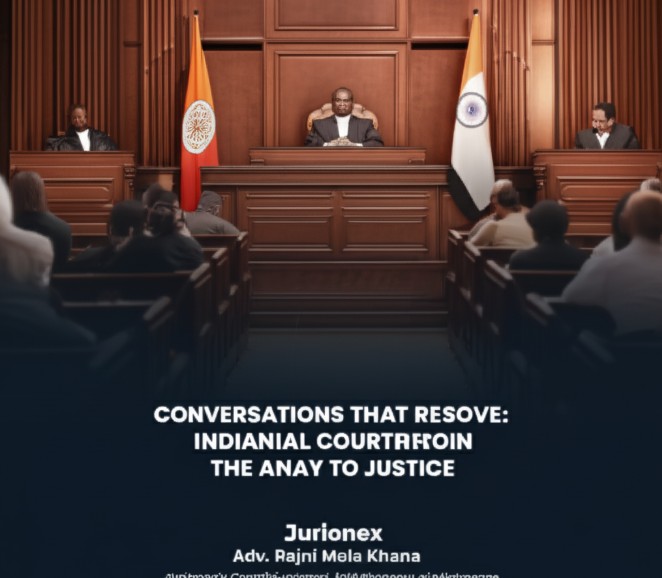We often picture justice unfolding dramatically in a courtroom: sharp-suited lawyers clashing, a judge’s gavel echoing, and a definitive order sealing a conflict’s fate. But beneath the surface of India’s towering legal system, a profound and quiet revolution is reshaping how disputes are resolved, bringing a breath of fresh air to millions.
It’s called Alternative Dispute Resolution (ADR). Yet, to call it “alternative” now feels almost quaint. In truth, ADR is rapidly becoming the primary and preferred route for navigating the complexities of civil, corporate, and even deeply personal family disputes across the nation.
A Gentle Shift: From Confrontation to Compassionate Resolution
Imagine a world where disputes aren’t battles to be won, but challenges to be collaboratively overcome. That’s the heart of ADR. Terms like Mediation, Arbitration, and Neutral Evaluation aren’t just legal jargon; they represent a fundamental shift in mindset – from adversarial confrontation to constructive collaboration, from rigid verdicts to dignified resolutions.
Unlike traditional litigation, where one party often emerges victorious at the expense of the other, ADR fosters outcomes where both parties can walk away with their dignity intact, their privacy preserved, and often, a profound sense of relief. It’s about finding common ground, not just fighting for a judgment.
India, a vibrant democracy wrestling with over 4 crore pending cases, has come to a stark realization: not every disagreement demands a bench, a witness stand, or years of courtroom drama. In fact, for many, the courtroom proves to be a poor fit.
Through dedicated mediation centres, community-driven Lok Adalats, and streamlined institutional arbitration, disputes that once languished for years in the legal pipeline are now finding resolutions in a matter of weeks, sometimes even days. Quietly. Peacefully. And with remarkable power.
ADR in the Boardroom: Speeding Up Corporate & Commercial Justice
In the high-stakes world of India Inc., within the intricate clauses of global contracts, arbitration has become not just an option, but a non-negotiable standard. Today’s international business agreements almost universally include arbitration clauses, a testament to its efficiency. India’s recent legislative pushes to make arbitration more robust and enforceable have only solidified this trend.
What once consumed five exhaustive years in court, draining resources and delaying progress, now often concludes in a focused six-month period around a conference table. This shift provides businesses with the speed, privacy, and specialized expertise crucial for navigating complex commercial disputes, allowing them to focus on growth rather than endless litigation.
ADR in the Home: Healing What Courts Cannot
Perhaps nowhere is the human touch of ADR more vital than in family law. Disputes surrounding marriage, separation, child custody, or inheritance carry an immense emotional weight that no court judgment can truly alleviate.
In these deeply personal matters, mediation transcends a mere legal process; it becomes a healing journey. Sitting across from each other with the guidance of a neutral, empathetic facilitator, families often discover something our adversarial system rarely offers: genuine understanding and a path to preserve relationships even amidst conflict. Not every wound needs a verdict; some truly need a conversation, a space for dialogue, and a chance to rebuild trust.
For Tomorrow’s Legal Minds: Embracing the ADR Era
Here’s a truth I passionately share with every budding lawyer and intern at Jurionex:
“If you cannot negotiate peace, you are not truly ready to champion justice.”
Litigation will always remain a foundational pillar of the legal profession. However, the truly impactful legal warriors of the future will be those who possess the wisdom to discern when to argue fiercely, and when to listen empathetically; when to push for a win, and when to guide towards a mutually beneficial resolution through mediation.
Learning ADR is no longer merely an “optional” extra on a lawyer’s resume. It is, in fact:
- A critical, value-adding skill in the competitive landscape of corporate and commercial law.
- A powerful differentiator that builds trust and delivers profound results in family law practice.
- A reputation-builder that marks you as a pragmatic, effective problem-solver in civil matters.
While law schools and moot courts are rightly catching up, the profound and practical training truly begins in the real world: by shadowing experienced mediators, meticulously drafting arbitration agreements, and developing the acute ability to “read” silence and unspoken emotions as clearly as you interpret statutes.
Beyond the Headlines: The True Promise of ADR
The ultimate triumph of ADR isn’t simply faster case disposal numbers. It’s about restoring dignity to the entire process of dispute resolution. It’s about empowering individuals and businesses by giving them agency and voice in crafting their own solutions. Most profoundly, it’s about humanizing the law itself.
In a country as richly diverse, emotionally intricate, and pluralistic as India, we don’t just need more courtrooms; we desperately need more conversations. And ADR, when practiced with skill, empathy, and integrity, is precisely that: justice delivered through constructive dialogue.
At Jurionex, we don’t view ADR as an “alternative.” We see it as alignment – alignment with values, with efficiency, and with the deep human need for empathy. As lawyers, our highest duty isn’t just to argue well, but to resolve wisely. If litigation is the necessary sword, then ADR is the essential bridge. And the stronger, more harmonious India we are striving to build truly needs both.
Written by: Adv. Rajni Bala Khanna
Founder, Jurionex | Advocate | Conflict Resolution Advocate
#JurionexExplains | #ADRIndia | #MediationMatters | #LawWithGrace | #JusticeThroughDialogue





